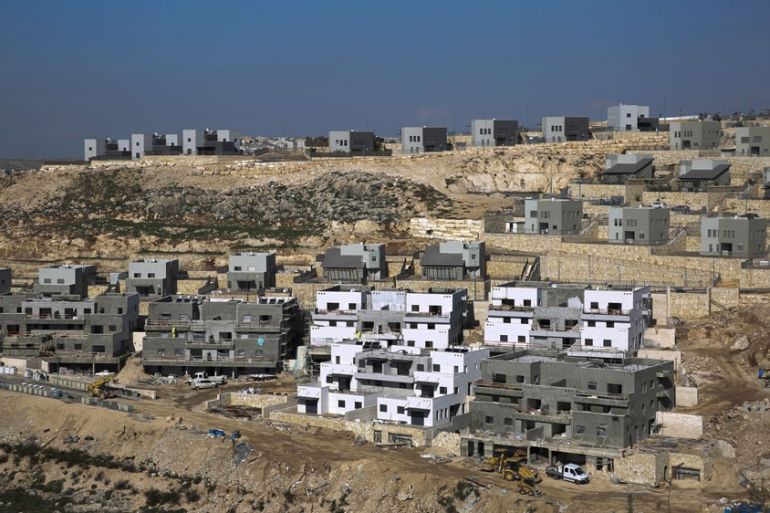Israeli settlements funding jumped since Trump: official data
Official data shows Israeli settlements’ funds in occupied West Bank rose from $330m to $459m after Trump’s election.

Israel‘s government went on a spending binge on its illegal West Bank settlements following the election of US President Donald Trump, according to official data obtained by AP news agency.
The government statistics, released by Israel’s finance ministry, showed Israeli spending in the West Bank in 2017, Trump’s first year in office, rose to about $459m, from about $330m in 2016.
Keep reading
list of 4 itemsAre settler politics running unchecked in Israel?
What is Israel’s bulldozer strategy in the occupied West Bank?
Israeli raids cause ‘worst destruction in decades’ in Tulkarem
The 2017 figures were the highest in the 15 years of data provided by the finance ministry, though spending also climbed in 2016.
At the time, President Barack Obama, a vocal critic of the settlements, had cool relations with Prime Minister Benjamin Netanyahu.
In contrast, the lowest year of Israeli spending was 2009, when both Netanyahu and Obama took office, when it was about $210m.
Hagit Ofran, a researcher with the anti-settlement monitoring group Peace Now, said it appeared that Trump’s election had emboldened Israel’s pro-settler government.
“They are not shy any more with what they are doing,” she said. “They feel more free to do whatever they want.”
Nabil Abu Rdeneh, spokesman for Palestinian President Mahmoud Abbas, offered even sharper criticism.
“This proves that the current US administration encouraged settlement activities,” he said.
|
|
Since capturing the West Bank and East Jerusalem in the 1967 Mideast war, Israel has settled about 700,000 of its citizens in the two areas, which are considered occupied territory under international law.
The international community has objected to Israel’s moving people into settlements in those territories as both illegal and a deliberate obstacle to any future Palestinian state.
The Palestinians, who claim both the West Bank and east Jerusalem as parts of their future state, consider the settlements illegal land grabs.
Scores of fast-growing settlements control strategic hilltops and swaths of the West Bank, making it increasingly difficult to partition the territory.
For decades, the international community and the US have expressed concern over the settlements while doing little to halt their construction.
But since taking office, Trump, whose inner circle of Middle East advisers have longstanding ties to the settler movement, has taken a different approach.
The White House has urged restraint, but refrained from the blanket condemnations of its Republican and Democratic predecessors.
“The Trump administration is undoubtedly the most friendly American administration of all time,” said Oded Revivi, the chief foreign envoy of the Yesha settlers’ council.
“In contrast, the [former US president Barack] Obama years were extremely hard for Israel. Now we are making up for lost ground.”
Near future
In recent months, both Peace Now and settler advocates have released reports claiming that Trump’s policies have laid the groundwork for a settlement boom in the near future.
In a statement, the US Embassy in Jerusalem repeated the White House policy.
|
|
“While the existence of settlements is not in itself an impediment to peace, further unrestrained settlement activity doesn’t help peace,” it said.
The new data added to Palestinian distrust of the US, boding poorly for a new peace plan the administration says it is preparing.
The Palestinian Authority cut off ties with the White House after Trump recognised Jerusalem as Israel’s capital in December 2017 and subsequently moved the US Embassy to the contested city.
US cuts of hundreds of millions of dollars in aid for the Palestinians have further poisoned the atmosphere.
Claiming the Trump administration is unfairly biased, the Palestinians already have said they will reject any US peace plan.
Abu Rdeneh, the Palestinian spokesman, said the numbers were “another reason why we think that the US plan is unfair”.
The finance ministry data is collected each year and shared with the US, which under a policy going back to President George HW Bush, deducts the sum from loan guarantees for Israel.
It also includes a small, but unspecified sum spent in the occupied Golan Heights.
Just a few thousand Israeli settlers live in the Golan, and Peace Now said the sums spent there were “not significant”.
|
|